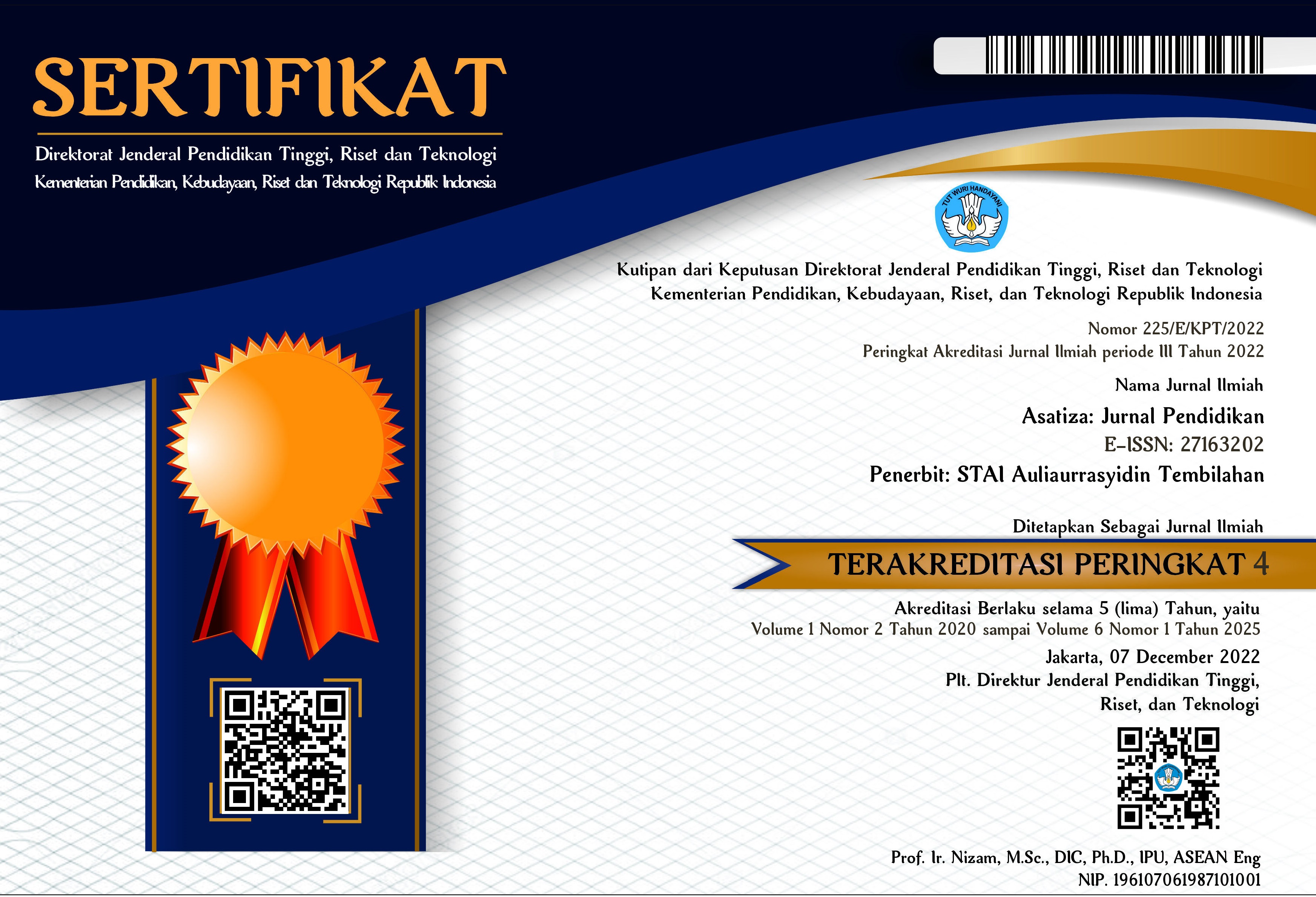Persepsi Mahasiswa sebagai Calon Guru Pendidikan Agama Islam (PAI) dalam Menghadapi Tantangan Era Digital (Studi Pada Mahasiswa Program Studi PAI UIN Sumatera Utara)
DOI:
https://doi.org/10.46963/asatiza.v4i1.792Keywords:
Digital, PAI Teacher, Student PerceptionAbstract
This research is intended to collect the student's perceptions as candidates for pai in the digital age. The focus of the study is student perceptions, challenges, and the role of pai student in the digital age. The research methods used are qualitative with a descriptive study approach. The techniques used to collect data are observation, interviews, and documentation. Next, to analyze the data using the miles and huberman techniques of data reduction, data presentation, and deduction. As a result of this study, being a pai teacher in the digital age has been difficult because it has to face challenges such as scientific development and a moral crisis. As for the efforts that can be made, students must be digital literacy, innovating varying methods and media, following the growth of curriculum, and preparing materials according to the original sources.
Downloads
References
Abdullah, A. dan R. T. (2020). Honor mengajar dalam perspektif hadits dan cara menumbuhkan nilai-nilai keikhlasan dalam mengajar. Tarbiyah: Jurnal Pendidikan Islam, 9439(6). https://doi.org/https://doi.org/10.54621/jiat.v6i1.171
Astuti, Waluya, S. B., & Asikin, M. (2019). Strategi pembelajaran dalam menghadapi tantangan era revolusi 4.0. Seminar Nasional Pascasarjana 2019, 2(1), 469–473. Retrieved from https://proceeding.unnes.ac.id/index.php/snpasca/article/view/327
Elizagoyen, V., & Pons, J. (2008). Agen. ADLFI. Archéologie de La France - Informations, 1(1), 32–43. https://doi.org/10.4000/adlfi.2398
Fibi, A, H. (2014). Optimalisasi Peran Fungsi Mahasiswa Seba. Surabaya: Politeknik Elektronika Negeri.
Hawa, S. (2022). Peran guru sebagai role model menurut konsep Albert Bandura dalam menerapkan Kurikulum 2013. Jurnal Aktualisasi Pendidikan Islam, 19(2). https://doi.org/10.58645/jurnalazkia.v15i1.203
Hidayat, N. (2015). Peran dan tantangan pendidikan agama Islam Di Era Global. El-Tarbawi, 8(2), 131–145. https://doi.org/10.20885/tarbawi.vol8.iss2.art2
Ismail. (2015). Peningkatan kompetensi pedagogik guru PAI dalam Pembelajaran. Mudarrisuna, 4, 704–719. Retrieved from https://www.unimed.ac.id/2020/05/19/mengkaji-pandemi-covid-19-dari-kacamata-antropologi/
Lukita, C., Christina, S., Pranata, S., & Supriyadi, A. (2022). Peningkatan kapasitas mahasiswa dalam menghadapi peluang dan tantangan di era transformasi digital society 5.0. Jurnal Abdi Insani, 9(3), 955–962. https://doi.org/10.29303/abdiinsani.v9i3.685
Nudin, B. (2020). Konsep pendidikan Islam pada remaja. LITERASI (Jurnal Ilmu Pendidikan), XI(1), 63–74. http://dx.doi.org/10.21927/literasi.2020.11(1).63-74
Petrus, J., Wote, A. Y. V., Sabarua, J. O., & Patalatu, J. S. (2022). Melek Digital: Tantangan Guru Saat Pandemi Covid-19. Jurnal Basicedu, 6(2), 2477–2485. https://doi.org/10.31004/basicedu.v6i2.2382
Sari, R. R., Febrini, D., & Walid, A. (2021). Tantangan guru PAI dalam menghadapi era perubahan globalisasi teknologi industri 4.0 di SMA Negeri 01 Bengkulu Tengah. GHAITSA: Islamic Education Journal, 2(1), 26–34. Retrieved from https://siducat.org/index.php/ghaitsa/article/view/170
Setyadi, Y. D., Wulandari, D., Lestari, L. D., Meliasari, W. O., & Sari, I. N. (2021). Peran mahasiswa kampus mengajar 2 sebagai “Agent Of Change dan Social Control.” Dinamisia : Jurnal Pengabdian Kepada Masyarakat, 5(6), 1542–1547. https://doi.org/10.31849/dinamisia.v5i6.8592
Simbolon, M. (2008). Persepsi dan kepribadian. Jurnal Ekonomi Dan Bisnis, 2(1), 52–66. https://doi.org/10.58303/jeko.v1i1.516
Surya, I. (2016). Ilma SuryaIstiqomaharani Sandra_Susan. Surabaya: STIBA Satya Widya Surabaya.
Wicaksono, B. W. (2021). Peran pendidikan agama Islam dalam membangun karakter mahasiswa di era milenial. Tarbiyatu Wa Ta’lim: Jurnal Pendidikan Agama Islam, 3(1), 1-9. Retrieved from https://ejournal.staisyamsululum.ac.id/index.php/jtt/article/view/93
Downloads
Published
Issue
Section
License
Copyright (c) 2023 Arlina Arlina, Ridha Nabila, Nursela Anggraini, Aldikha Aditya Maulana, Siti Rahmaini

This work is licensed under a Creative Commons Attribution-ShareAlike 4.0 International License.
Authors who publish with this journal agree to the following terms:
1. Copyright on any article is retained by the author(s).
2. The author grants the journal, right of first publication with the work simultaneously licensed under a Creative Commons Attribution shareAlike 4.0 International License that allows others to share the work with an acknowledgment of the work’s authorship and initial publication in this journal.
3. Authors are able to enter into separate, additional contractual arrangements for the non-exclusive distribution of the journal’s published version of the work (e.g., post it to an institutional repository or publish it in a book), with an acknowledgment of its initial publication in this journal.
4. Authors are permitted and encouraged to post their work online (e.g., in institutional repositories or on their website) prior to and during the submission process, as it can lead to productive exchanges, as well as earlier and greater citation of published work.
5. The article and any associated published material is distributed under the Creative Commons Attribution-ShareAlike 4.0 International License











2.png)



